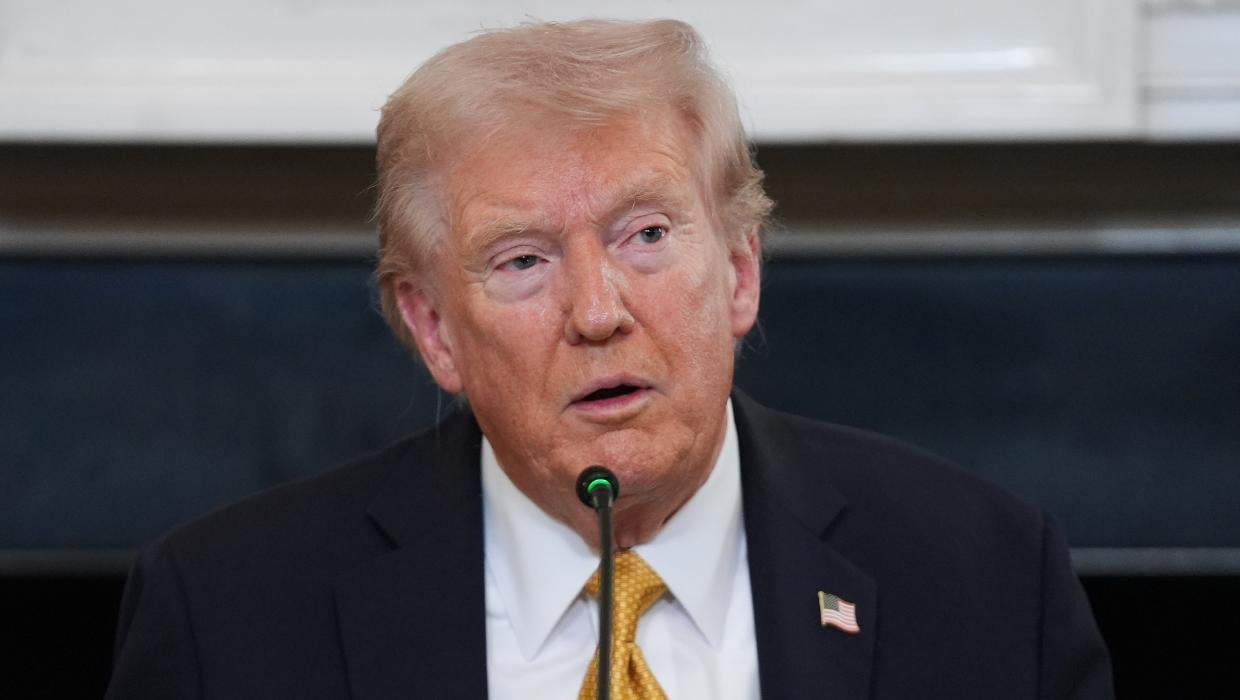Politics
Trump Halts Trade Talks with Canada Over Controversial Ads

Donald Trump announced the cancellation of trade talks with Canada in response to controversial television advertisements aired by the Canadian government. This decision comes shortly after Canadian Prime Minister Mark Carney revealed plans to double his country’s exports to nations outside the United States, citing the risks associated with Trump’s tariffs.
The tension between the two nations has escalated as Canada seeks to diversify its trade relations. Carney emphasized the necessity of expanding exports, particularly in light of the unpredictable trade environment created by U.S. policies. His comments highlight a strategic pivot aimed at reducing reliance on the American market.
Context of the Trade Dispute
The trade negotiations were intended to address various economic concerns, but the recent advertising campaign by the Canadian government prompted a swift response from Trump. The ads, which were critical of Trump’s tariff policies, reportedly included messaging aimed at Canadian consumers and businesses. Trump characterized this strategy as “egregious behavior,” asserting that it undermines the spirit of cooperation.
In a statement on his social media platform, Trump expressed his disappointment with Canada’s approach, describing the advertisements as an attack on U.S. interests. He asserted that such tactics would not be tolerated and indicated that the cancellation of talks would remain in effect until further notice.
Carney’s strategy to bolster exports reflects a broader trend among Canadian leaders to mitigate risks associated with U.S. trade policies. In his announcement, he outlined ambitious targets, including a goal to increase exports by 20% within the next five years. This shift aims to enhance Canada’s economic resilience and reduce vulnerability to external pressures.
Implications for Future Relations
The breakdown of negotiations may have significant implications for both countries. The United States remains Canada’s largest trading partner, accounting for approximately 75% of Canadian exports. Conversely, Canada is a vital market for U.S. goods and services. The disruption in talks could affect various sectors, including agriculture, manufacturing, and technology.
Analysts are closely monitoring the situation, as the cancellation of trade discussions could lead to increased tariffs and a potential trade war. The economic impacts may ripple through supply chains and affect consumers on both sides of the border.
As Canada navigates this complex landscape, the government is likely to explore new trade agreements with other nations, including countries in Asia and Europe. These efforts may be crucial in offsetting any losses resulting from reduced trade with the United States.
In conclusion, the cancellation of talks between Trump and Carney signifies a pivotal moment in U.S.-Canada relations. As both leaders pursue their economic agendas, the outcomes of this dispute will shape the future of trade between the two nations.
-

 World3 weeks ago
World3 weeks agoPrivate Funeral Held for Dean Field and His Three Children
-

 Top Stories3 weeks ago
Top Stories3 weeks agoFuneral Planned for Field Siblings After Tragic House Fire
-

 Sports3 months ago
Sports3 months agoNetball New Zealand Stands Down Dame Noeline Taurua for Series
-

 Entertainment3 months ago
Entertainment3 months agoTributes Pour In for Lachlan Rofe, Reality Star, Dead at 47
-

 Entertainment2 months ago
Entertainment2 months agoNew ‘Maverick’ Chaser Joins Beat the Chasers Season Finale
-

 Sports3 months ago
Sports3 months agoSilver Ferns Legend Laura Langman Criticizes Team’s Attitude
-

 Sports1 month ago
Sports1 month agoEli Katoa Rushed to Hospital After Sideline Incident During Match
-

 World4 weeks ago
World4 weeks agoInvestigation Underway in Tragic Sanson House Fire Involving Family
-

 Politics2 months ago
Politics2 months agoNetball NZ Calls for Respect Amid Dame Taurua’s Standoff
-

 Top Stories3 weeks ago
Top Stories3 weeks agoShock and Grief Follow Tragic Family Deaths in New Zealand
-

 Entertainment7 days ago
Entertainment7 days agoJacinda Ardern Discusses Popularity Decline on Graham Norton Show
-

 Sports2 weeks ago
Sports2 weeks agoEli Katoa Shares Positive Recovery Update After Brain Surgery





















